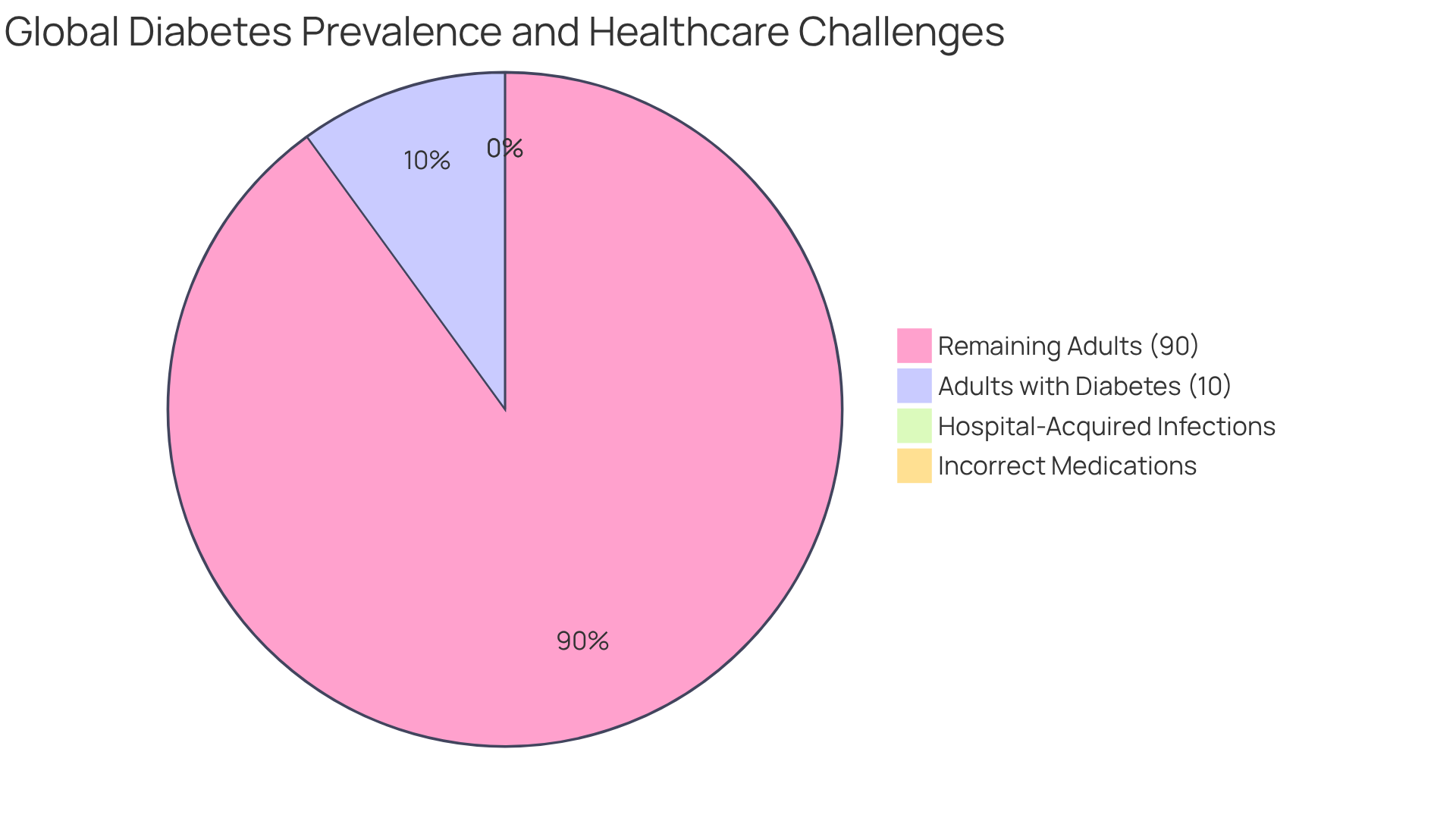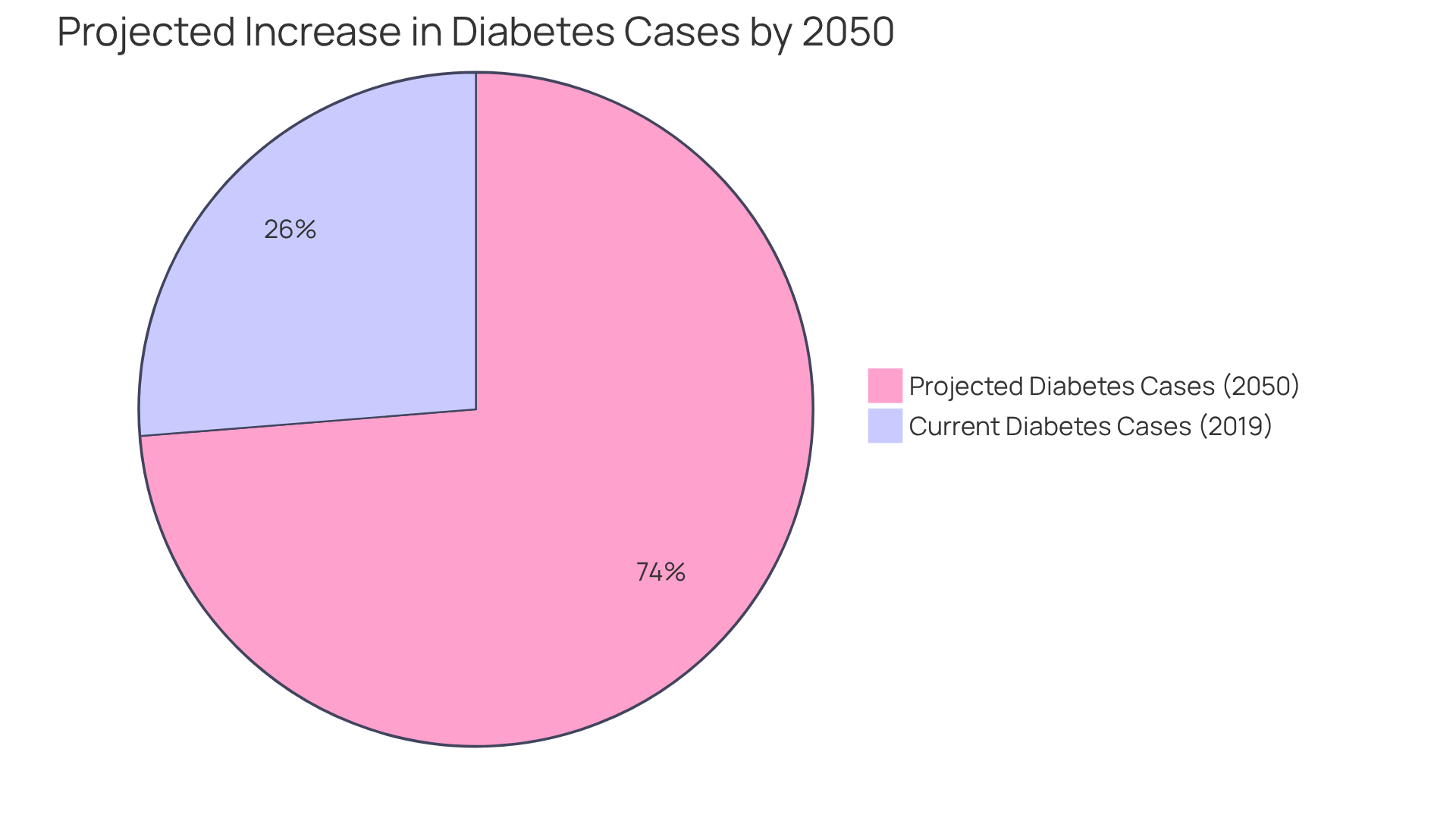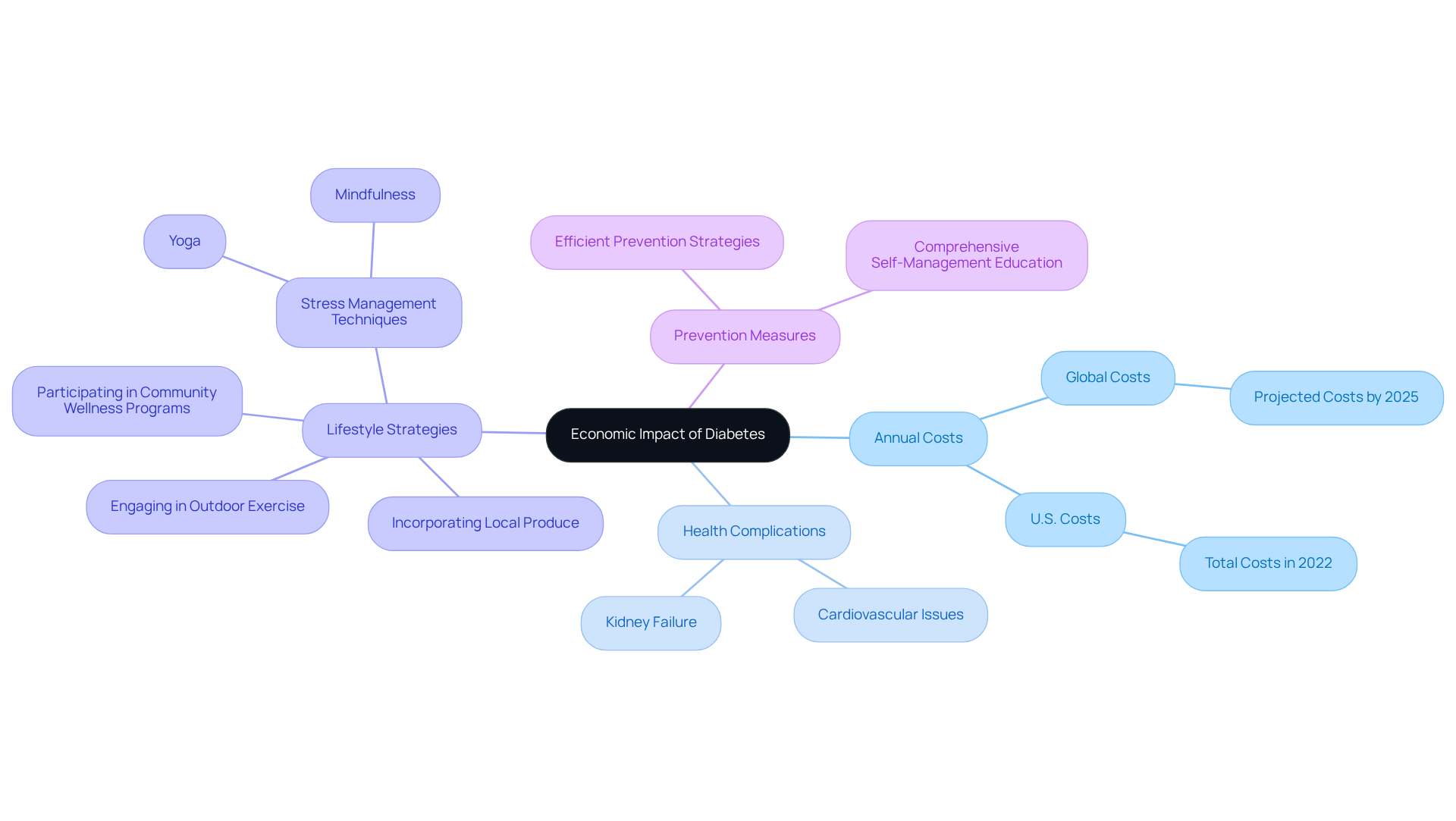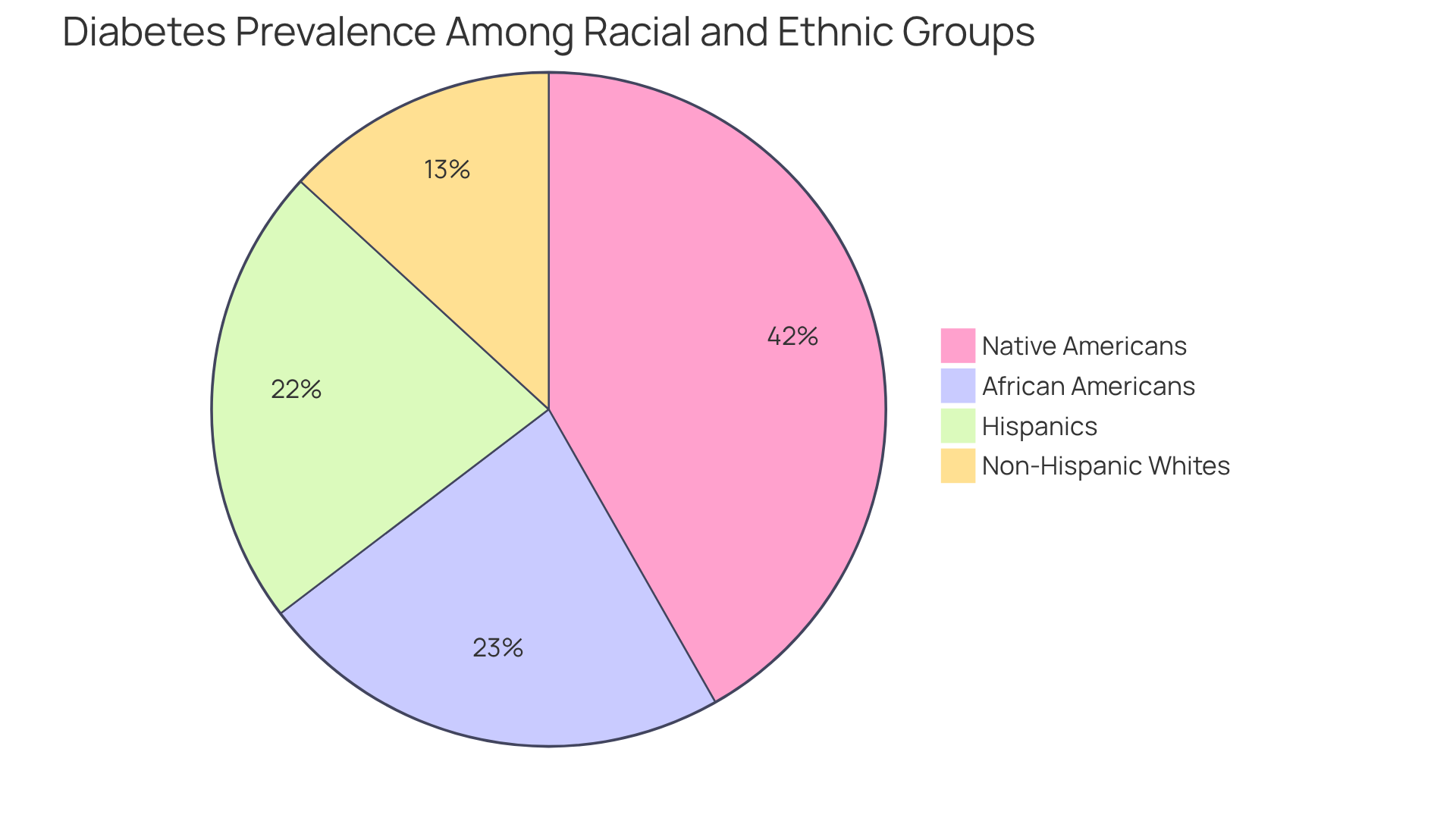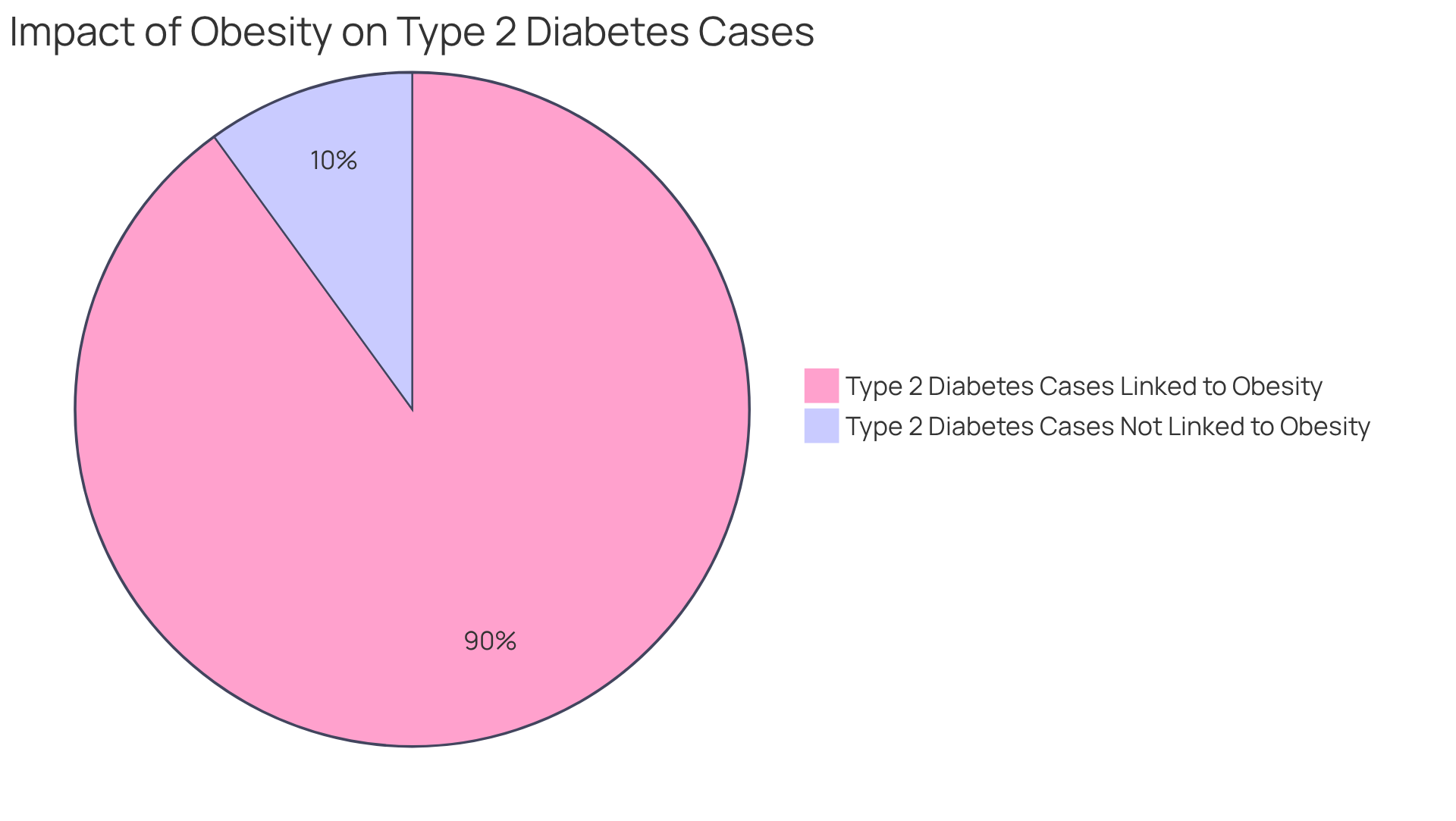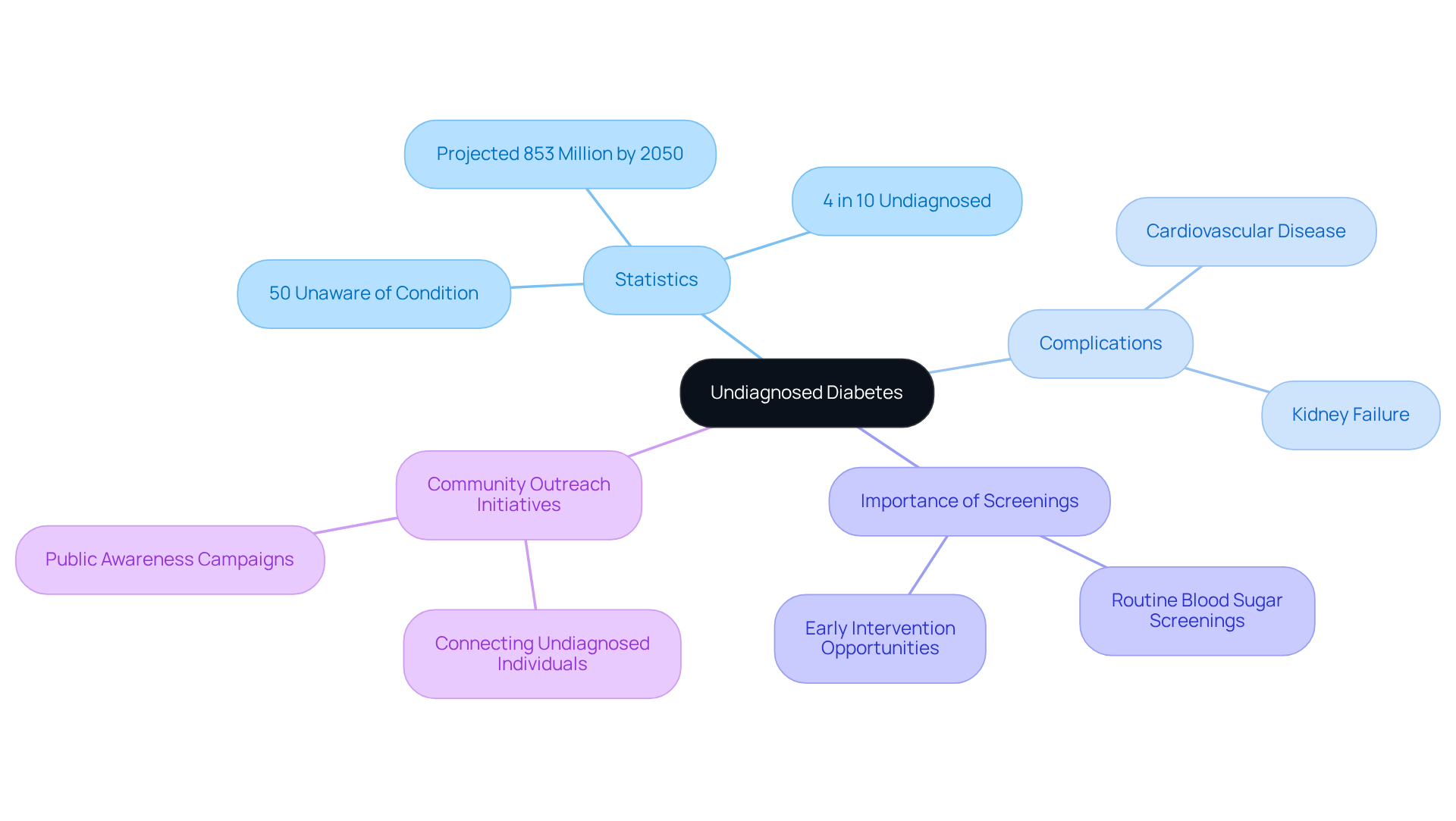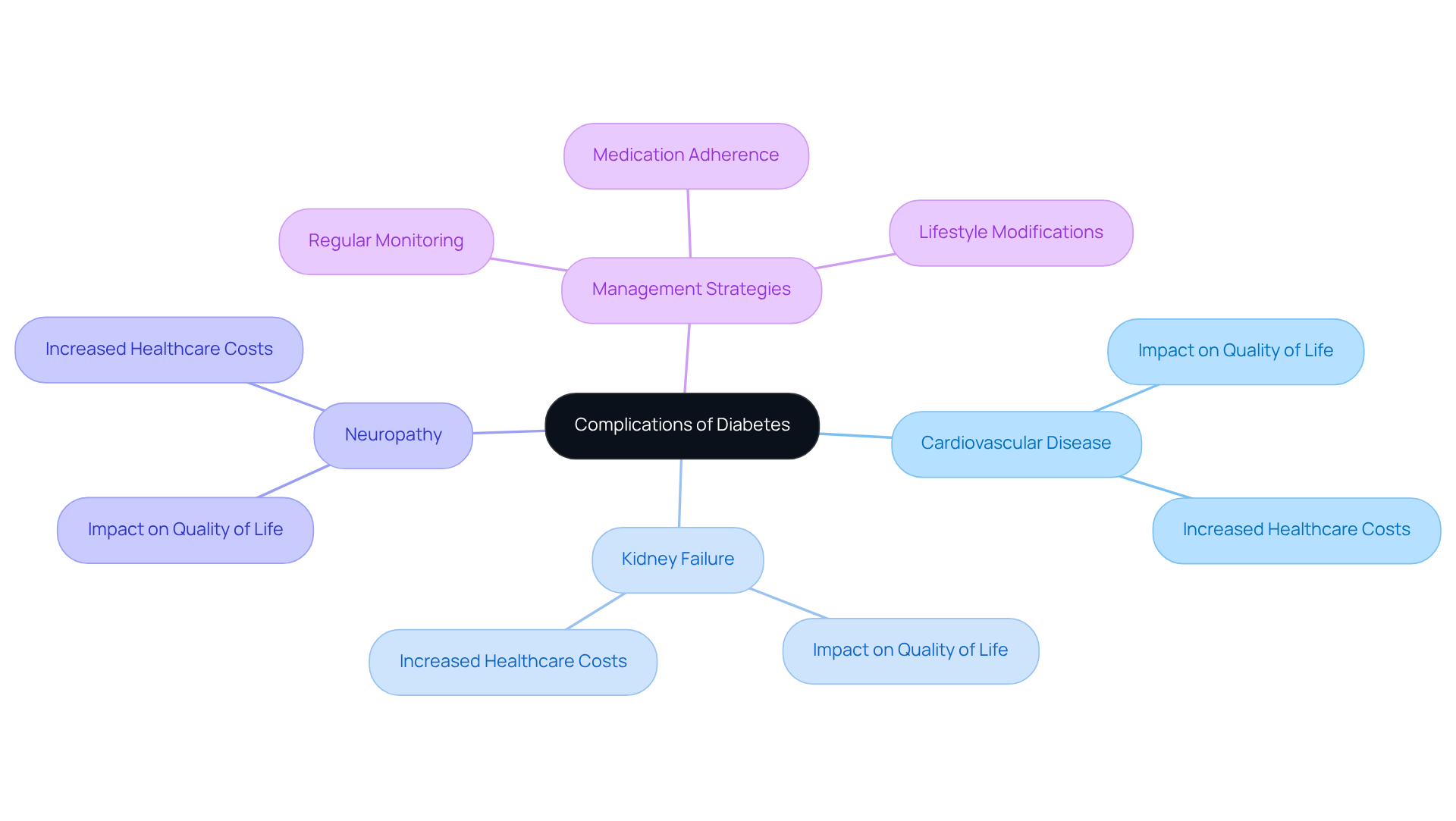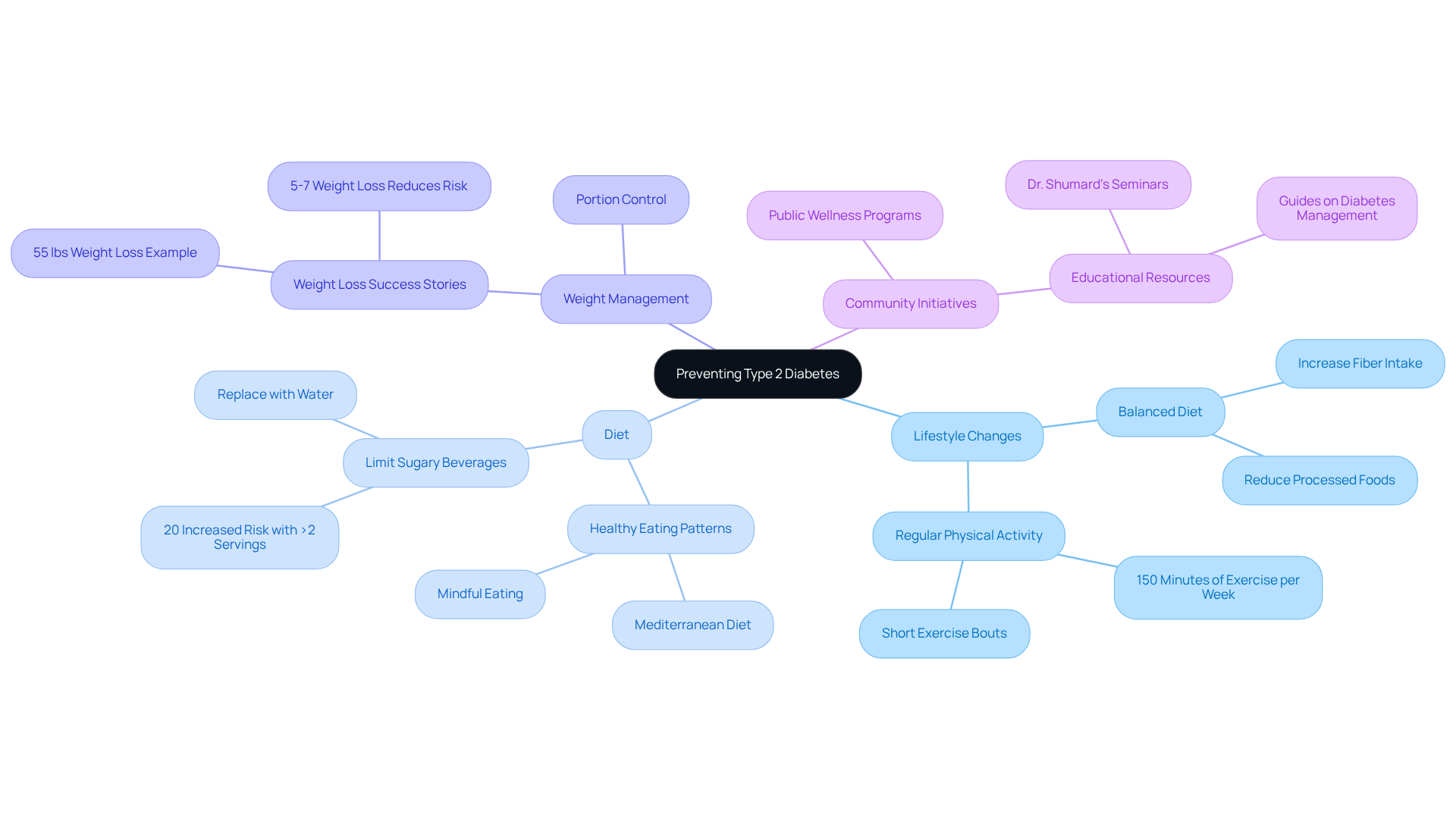Overview
Did you know that approximately 1 in 10 adults worldwide, which translates to around 830 million people, are grappling with type 2 diabetes? This staggering statistic highlights a significant global health crisis that affects countless lives. It’s important to recognize that the urgency of addressing this epidemic cannot be overstated. Without effective prevention and management strategies, projections indicate that the number of cases could soar to 1.3 billion by 2050.
Many patients find that understanding their condition is the first step toward taking control of their health. By acknowledging the struggles faced by those living with diabetes, we can foster a supportive environment that encourages proactive measures. Imagine the difference that effective strategies could make in your life or the life of someone you care about.
Together, we can work towards a healthier future. The 30-Day Diabetes Reset program offers a compassionate approach to managing diabetes, providing the tools and support needed to make lasting changes. Let’s take this journey together, one step at a time.
Introduction
Did you know that approximately 1 in 10 adults worldwide are living with type 2 diabetes? This staggering figure equates to around 830 million individuals. It’s important to recognize that this statistic highlights a growing global health crisis, emphasizing the pressing need for effective prevention and management strategies. As the prevalence of this condition continues to rise, many individuals may wonder:
- What are the underlying causes driving this epidemic?
- How can one take proactive steps to combat it?
Exploring these critical issues reveals an urgent need for awareness, education, and innovative approaches to diabetes management. Many patients find that understanding their condition is the first step toward better health. By acknowledging these challenges, we can foster a supportive environment that encourages healthy living and empowers individuals to take action. Together, we can navigate the complexities of diabetes and work towards a healthier future.
Integrative Wellness Center: 30-Day Diabetes Reset Program for Lasting Health Transformation
Are you feeling overwhelmed by diabetes? The Integrative Wellness Center understands your struggles and offers a transformative 30-Day Diabetes Reset Program designed just for you. This program empowers individuals with essential tools and knowledge to enhance their wellness. At the heart of this journey is personalized coaching, focusing on behavior modification, nutrition, and physical activity. Many participants find that cultivating sustainable habits leads to significant improvements in their well-being and blood sugar management.
It’s important to recognize that education plays a vital role in this process. Our program includes valuable materials, such as seminars and informative books authored by Dr. Jason Shumard. These resources explore effective strategies for reversing glucose-related issues and achieving optimal thyroid function. This comprehensive approach not only promotes immediate wellness benefits but also equips you with the skills necessary for lasting success.
Imagine the possibility of a healthier future. You deserve to feel empowered and supported every step of the way. Let’s embark on this journey together, transforming challenges into triumphs and fostering a life of wellness.
1 in 10 Adults Worldwide Have Diabetes: A Global Health Crisis
Did you know that approximately 1 in 10 adults worldwide are affected by this condition, prompting us to consider how many people have type 2 diabetes in the world? That translates to around 830 million people, which reflects how many people have type 2 diabetes in the world. This staggering statistic underscores the urgent need for effective prevention and management strategies. It’s important to recognize that recent reports indicate:
- 7,000 incorrect medications given to patients in hospitals
- 80,000 infections acquired in those same settings
The World Health Organization has acknowledged how many people have type 2 diabetes in the world as an increasing epidemic, significantly impacting global wellness systems and economies.
At Integrative Wellness Center, we truly understand the challenges faced by those living with Type 2 Diabetes. Many patients find that navigating their health can feel overwhelming. Dr. Jason Shumard’s patient-centered approach is designed to empower individuals through personalized functional medicine, tailored nutrition, and comprehensive care, all backed by cutting-edge science and clinically validated results.
By addressing the underlying factors of this condition, we strive to revolutionize healthcare and offer wellness solutions that prioritize your well-being. Imagine taking steps toward a healthier life with the support you deserve. We invite you to contact us today at (858) 564-7081 or visit us at 7094 Miramar Road, Suite 109, San Diego, CA 92121. Let us support you on your journey to reversing Type 2 Diabetes.
Diabetes Cases in Youth: Over 200 Million Children Affected Globally
Recent estimates indicate that more than 200 million children worldwide are impacted by this condition, raising questions about how many people have type 2 diabetes in the world, which is increasingly identified in younger demographics. It’s important to recognize that this concerning trend presents considerable health dangers. Early onset of the condition can lead to serious complications like cardiovascular disease and kidney failure, which is truly alarming. The prevalence of type 2 conditions in youth is particularly concerning, especially in light of how many people have type 2 diabetes in the world, with projections indicating a continued rise in cases by 2025.
Many parents may wonder how this is happening, and factors such as childhood obesity play a critical role in this increase. Excess weight is a major risk factor for developing type 2 diabetes, prompting the need to understand how many people have type 2 diabetes in the world and to address this issue. To combat this growing epidemic, a multifaceted approach is essential. This includes:
- Education on healthy lifestyle choices
- Improved access to preventive healthcare
- Targeted interventions that address the unique challenges faced by young individuals
By fostering awareness and promoting proactive wellness measures, we can work towards reversing this troubling trend. Together, we can safeguard the future well-being of our children. Let’s take action now to ensure a healthier tomorrow for them.
Projected Diabetes Cases to Reach 1.3 Billion by 2050: A Call to Action
Current trends indicate that by 2050, we may see an astonishing 1.3 billion people worldwide, which raises concerns about how many people have type 2 diabetes in the world. This projection is alarming and highlights the critical need for robust public wellness strategies focused on prevention and management. It’s important to recognize that successful programs promoting healthy living, routine check-ups, and thorough education about the illness are essential in alleviating this impending wellness crisis. Many patients find that without prompt measures, the strain of this condition will continue to grow, impacting individuals and medical systems globally.
Effective public health initiatives have demonstrated that targeted interventions can significantly reduce the prevalence of this condition. This underscores the necessity of proactive measures in combating this epidemic. As we approach 2025, the need for creative strategies to address the condition becomes increasingly clear. Expert forecasts suggest that the prevalence will only rise if current trends persist. Together, we can work towards a healthier future, emphasizing the importance of taking action now.
$760 Billion Annual Cost of Diabetes: Economic Impact on Global Health
The economic burden of this condition is staggering, with annual costs projected to reach $760 billion globally by 2025. This figure encompasses direct medical expenses, lost productivity, and the costs associated with managing diabetes-related complications. In the United States alone, the total direct and indirect costs of diagnosed diabetes-related conditions were estimated at $413 billion in 2022, reflecting a significant increase from previous years. It’s important to recognize that this chronic illness is not only the most costly but also a primary cause of avoidable complications, such as cardiovascular issues and kidney failure.
The economic effect of this condition extends beyond healthcare expenses, impacting individuals and families through lost income and diminished quality of life. Many patients find that adopting holistic lifestyle strategies—such as:
- Incorporating local produce from farmers’ markets
- Engaging in outdoor exercise
- Participating in community wellness programs
can significantly improve health outcomes and help mitigate these costs. Stress management techniques, like yoga and mindfulness, further support better blood sugar control.
Economists stress the immediate requirement for efficient prevention measures, as early actions can greatly lower the occurrence of the disease and its related expenses. Effective cost-reduction strategies in managing blood sugar conditions consist of comprehensive self-management education and support (DSMES) programs, which have been demonstrated to enhance patient outcomes while reducing medical expenses. As the occurrence of blood sugar issues keeps increasing, tackling these economic challenges through tailored functional medicine methods and community assistance is vital for sustainable medical systems globally.
Disparities in Diabetes: Higher Rates Among Minority Populations
Diabetes has a profound impact on minority populations, particularly within Black, Hispanic, and Native American communities. It’s important to recognize that the prevalence of diagnosed type 2 diabetes is strikingly high—13.2% among African Americans, 12.8% in Hispanics, and 24.1% in certain Native American groups, compared to just 7.6% in non-Hispanic whites. These disparities are deeply influenced by various socioeconomic factors, such as limited access to medical care, economic challenges, and cultural attitudes toward health and wellness.
Many patients find that public wellness initiatives addressing these disparities are crucial. Programs like the South Asian Diabetes Self-Management Initiative have reached over 3,000 individuals, providing educational resources in multiple languages. These initiatives not only aim to raise awareness but also empower communities to take control of their health, working towards equity for all.
Considering the risks associated with traditional treatments, such as the potential for increased insulin resistance from recommended insulin injections, it’s essential to explore innovative strategies for managing diabetes. The Integrative Wellness Center offers comprehensive services designed to empower patients, including education on managing blood sugar levels and reducing reliance on insulin.
The mortality rate ratio for Non-Hispanic Black to Non-Hispanic White females stands at 1.5, underscoring the severity of these health disparities. This highlights the urgent need for comprehensive strategies that empower patients through education and holistic solutions. Together, we can work towards a healthier future, where everyone has access to the support they need.
Obesity Epidemic: 90% of Type 2 Diabetes Cases Linked to Excess Weight
It’s important to recognize how many people have type 2 diabetes in the world, as nearly 90% of type 2 diabetes cases are linked to excess weight, highlighting the significant role obesity plays in the development of this condition. This statistic brings to light the urgent need for effective weight management strategies. These strategies should encompass dietary changes and increased physical activity, which are essential components of prevention programs.
Many patients find that holistic approaches, including lifestyle modifications like balanced eating and regular exercise, can make a meaningful difference in managing weight and reducing the risk of blood sugar complications. Nutritionists advocate for these comprehensive strategies, understanding the emotional and physical challenges that come with weight management.
Public wellness initiatives must prioritize obesity reduction to effectively address the blood sugar crisis. By ensuring access to successful weight management programs tailored for those with metabolic issues, we can foster a supportive environment for individuals striving to improve their health. Together, we can navigate this journey toward better health and well-being.
Undiagnosed Diabetes: 50% of Cases Remain Unrecognized Globally
Did you know that almost 50% of individuals suffering from this condition remain unaware of it? This statistic underscores the vital need for increased awareness and proactive wellness measures. It’s important to recognize that this lack of diagnosis can lead to serious health complications, such as:
- Cardiovascular disease
- Kidney failure
These complications ultimately drive up medical expenses.
Routine screenings for blood sugar conditions are essential. They can help identify at-risk individuals before complications arise, offering a chance for early intervention. Many patients find that taking these steps not only improves their health but also reduces anxiety about the unknown.
Furthermore, community outreach initiatives play a crucial role in connecting undiagnosed individuals with accessible healthcare resources. By informing the public about risk factors and the importance of screenings, we can significantly reduce the number of undiagnosed cases. Together, we can enhance overall well-being and foster a healthier community.
Complications of Diabetes: 50% of Patients Experience Serious Health Issues
Almost 50% of individuals with diabetes face serious health issues, such as cardiovascular disease, kidney failure, and neuropathy. These challenges not only impact quality of life but also lead to significantly higher healthcare costs. Did you know that people with diabetes incur average annual medical expenses that are 2.6 times greater than those without the condition? It’s important to recognize that effective management strategies can help mitigate these risks. Regular monitoring, adherence to prescribed medications, and lifestyle modifications—like maintaining a healthy diet and engaging in regular physical activity—are essential for preventing adverse outcomes.
Many patients find that education and support play a crucial role in empowering them. This empowerment allows individuals to take control of their well-being and make informed choices regarding their care. As Tom Hanks wisely noted, maintaining health becomes increasingly important as we age. This underscores the need for proactive management of diabetes-related health issues. Remember, you are not alone on this journey; support is available, and taking action today can lead to a healthier tomorrow.
Lifestyle Changes: 80% of Type 2 Diabetes Cases Can Be Prevented with Proper Management
It’s important to recognize how many people have type 2 diabetes in the world, as studies indicate that up to 80% of these cases can be prevented through effective management and lifestyle changes. Imagine adopting a balanced diet filled with whole foods, engaging in regular physical activity, and maintaining a healthy weight. Many patients find that these strategies can truly transform their lives. For instance, one patient lost 55 lbs and reduced their A1C from 9.1 to 5.7 through Dr. Jason Shumard’s 30-Day Diabetes Reset program, exemplifying the program’s effectiveness.
Have you considered how dietary modifications can impact your health? Research indicates that increasing fiber intake and reducing processed foods can significantly lower the risk of developing type 2 diabetes. Moreover, public wellness initiatives play a crucial role in informing communities about these preventive strategies, offering essential resources to facilitate lifestyle adjustments. By empowering individuals with information and practical tools, we not only decrease the occurrence of type 2 diabetes but also enhance overall wellness outcomes, promoting a proactive approach to health management.
To learn more about how you can transform your health and embrace a healthier lifestyle, contact the Integrative Wellness Center today. You deserve support on this journey toward better health.
Conclusion
The alarming statistics surrounding type 2 diabetes highlight a significant global health crisis that truly deserves our immediate attention. With approximately 1 in 10 adults affected—around 830 million individuals—it’s clear that the urgency for effective prevention and management strategies cannot be overstated. This condition not only poses serious health risks but also places immense strain on healthcare systems and economies worldwide.
It’s important to recognize that the insights from the article reveal the multifaceted nature of this epidemic. From the rising prevalence of diabetes among youth to the staggering economic costs projected to reach $760 billion annually, many individuals find themselves overwhelmed by these realities. Proactive measures are essential. Education, lifestyle modifications, and community wellness initiatives are crucial in addressing the disparities faced by minority populations and those undiagnosed individuals who remain unaware of their condition. Furthermore, nearly 90% of type 2 diabetes cases are linked to obesity, underscoring the critical need for comprehensive weight management strategies.
As projections for diabetes cases continue to rise, it is imperative to take action now. By fostering awareness, providing education, and implementing innovative management programs, individuals can empower themselves and their communities to combat this epidemic. The journey towards a healthier future begins with understanding the challenges and taking proactive steps toward prevention and effective management. Together, a concerted effort can lead to meaningful change and improved health outcomes for all. Remember, you are not alone on this journey; support is available, and every step taken brings us closer to a healthier tomorrow.
Frequently Asked Questions
What is the 30-Day Diabetes Reset Program offered by the Integrative Wellness Center?
The 30-Day Diabetes Reset Program is a transformative initiative designed to empower individuals with diabetes by providing essential tools and knowledge to enhance their wellness through personalized coaching focused on behavior modification, nutrition, and physical activity.
How does the program help participants manage their diabetes?
The program helps participants by cultivating sustainable habits that lead to significant improvements in their well-being and blood sugar management, alongside education through seminars and informative materials authored by Dr. Jason Shumard.
What educational resources are included in the program?
The program includes valuable materials such as seminars and informative books that explore effective strategies for reversing glucose-related issues and achieving optimal thyroid function.
Why is diabetes considered a global health crisis?
Diabetes is considered a global health crisis because approximately 1 in 10 adults worldwide are affected by the condition, translating to around 830 million people. This highlights the urgent need for effective prevention and management strategies.
What are some alarming statistics related to diabetes management in hospitals?
Recent reports indicate that there have been 7,000 incorrect medications given to patients in hospitals and 80,000 infections acquired in those same settings, underscoring the challenges in diabetes management.
How many children are affected by diabetes globally?
More than 200 million children worldwide are impacted by diabetes, with an increasing prevalence of type 2 diabetes in younger demographics.
What are the health risks associated with early onset diabetes in children?
Early onset of diabetes can lead to serious complications such as cardiovascular disease and kidney failure, which are alarming health concerns.
What factors contribute to the rise of type 2 diabetes in youth?
Factors such as childhood obesity play a critical role in the increase of type 2 diabetes among young individuals.
What approach is suggested to combat the diabetes epidemic in youth?
A multifaceted approach is essential, including education on healthy lifestyle choices, improved access to preventive healthcare, and targeted interventions that address the unique challenges faced by young individuals.
